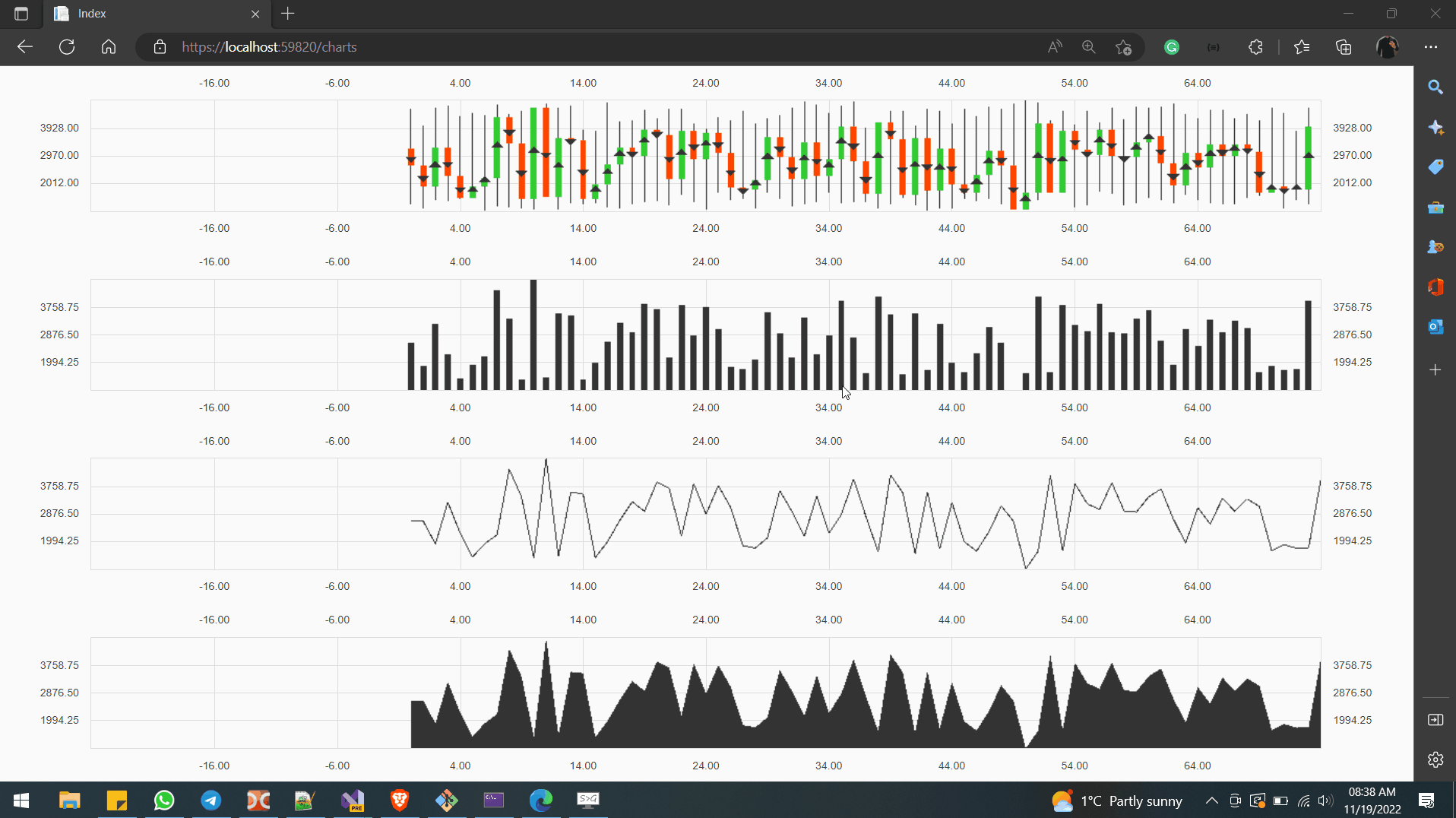The fastest charting web control targeting primarily Blazor, both Server Side and Web Assembly, and to some extent ASP.NET MVC. This charting library was designed for Web, but it can also be used in Desktop apps via Web View.
The main purpose of this library is to be used as a real-time charting tool for financial applications that require frequent updates, e.g. backtesters for trading strategies.
Here is the most comprehensive guide dedicated to charting in .NET that I have seen so far. Nevertheless, trying various options from that guide I wasn't able to find anything fast and flexible enough for my needs, so created my own.
Install-Package Canvas.Views.Web
Currently available controls.
- Engine - base control exposing drawing context for various frameworks, like
GDIorSkiaSharp - CanvasEngine - a wrapper around SkiaSharp and Open GL
To add different view types, e.g. GDI+, Direct 2D, Win UI, Open GL, implement IEngine interface.
At the moment, the library supports the following chart types.
- Line - line
- Bar - polygon
- Area - polygon
- Arrow - polygon
- Candle - OHLC box
- HeatMap - box
To add new chart types, e.g. Error Bars or Bubbles, implement IShape interface.
The simplest data format is a list of IShape models with a X and Y properties.
<CanvasView @ref="View"></CanvasView>
@code
{
public CanvasView View { get; set; }
protected override async Task OnAfterRenderAsync(bool setup)
{
if (setup)
{
var generator = new Random();
var points = Enumerable.Range(1, 1000).Select(i => new BarShape
{
X = i,
Y = generator.Next(-5000, 5000)
}).ToList();
var composer = new Composer
{
Name = "Demo",
Items = points
};
await View.Create<CanvasEngine>(engine => composer);
composer.Update();
}
await base.OnAfterRenderAsync(setup);
}
}By default, the axis X is used as an index that picks data points from the source list and axis Y is a value that represents the actual value of each data point on the vertical scale.
To simplify synchronization, you can use IGroupShape model instead of simple IShape.
This model allows grouping series for each chart by single timestamp, so you could display candles, lines, and other series on the same chart.
Item = new
{
Groups = new GroupShape
{
["Price Area"] = new Dictionary<string, GroupShape>
{
Groups = new GroupShape
{
["Price Series"] = new CandleShape(),
["Arrow Series"] = new ArrowShape()
}
},
["Indicator Area"] = new Dictionary<string, GroupShape>
{
Groups = new GroupShape
{
["Bar Series"] = new BarShape()
}
}
}
}The chart is data-centric, thus in order to scale the chart you need to change the data source.
By default, the chart displays last 100 data points, as defined in IndexCount property.
MinIndex = Items.Count - IndexCount
MaxIndex = Items.CountTo pan the chart to the left, subtract arbitrary value from both MinIndex and MaxIndex.
MinIndex -= 1
MaxIndex -= 1To pan the chart to the right, do the opposite.
MinIndex += 1
MaxIndex += 1To zoom in, increase MinIndex and decrease MaxIndex to decrease number of visible points.
MinIndex += 1
MaxIndex -= 1To zoom out, do the opposite.
MinIndex -= 1
MaxIndex += 1To increase performance, the chart is split into pieces and each piece is using its own thread, so UI is never blocked even while rendering 100K samples. To increase performance even further, downsampling could be implemented, e.g. when number of points is greater that width of the screen in pixels, because all points wouldn't fit on the screen anyway.



